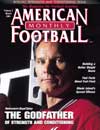Article CategoriesAFM Magazine
|
Building Bigger AthletesThe skinny on how to help players gain weight and not get fatby: Jacqueline R. Berning registered dietitian © More from this issue WHILE THE REST OF THE WORLD STRUGGLES TO lose a few pounds, for athletes often the hardest thing to do is gain weight. In fact, it actually takes longer to gain weight than to lose it. That's why it's important to devise good programs to help those skinny athletes bulk up. The ideal program, of course, would allow the athlete to achieve maximum muscle gains without adding much fat. It may be unrealistic, however, to expect an athlete to gain only lean tissue on a weight gain program. The key to gaining weight is to consume more calories than what an athlete expends in workouts and daily living. This may sound simple, but isn't since it takes time to gain weight. Family history also plays a major role in the natural development of an athlete's physique. Athletes from naturally thin families are less likely to be able to tr....The full article can only be seen by subscribers.
|
|
|||||||
| HOME |
MAGAZINE |
SUBSCRIBE | ONLINE COLUMNISTS | COACHING VIDEOS |
Copyright 2026, AmericanFootballMonthly.com
All Rights Reserved





